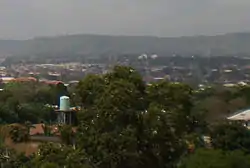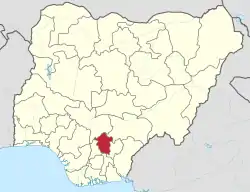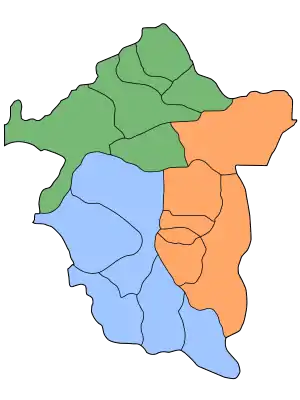Enugu State
Enugu,[5] usually referred to as Enugu State[6] to distinguish it from the city of Enugu, is a state in southeastern Nigeria, created in 1991[7] from part of the old Anambra State. Its capital[8] and largest city is Enugu, from which the state derives its name. The principal cities in the state are Enugu, Ohum, Ezeagu, Ngwo, Nsukka, Agbani, Awgu, Aninri and Udi.
Enugu State | |
|---|---|
 Enugu State | |
| Nicknames: | |
 Location of Enugu in Nigeria | |
| Coordinates: 6°30′N 7°30′E | |
| Country | |
| Date created | 27 August 1991 |
| Capital | Enugu |
| Government | |
| • Governor[2] | Ifeanyi Ugwuanyi (PDP) |
| • Deputy Governor | Cecilia Ezeilo |
| Area | |
| • Total | 7,161 km2 (2,765 sq mi) |
| Area rank | 29 of 36 |
| Population (2006 Census)[3] | |
| • Total | 3,267,837 |
| • Rank | 22 of 36 |
| • Density | 460/km2 (1,200/sq mi) |
| Time zone | UTC+01 (WAT) |
| postal code | 400001 |
| Dialing Code | +234 |
| ISO 3166 code | NG-EN |
| HDI (2018) | 0.634[4] medium · 10th of 37 |
| Website | enugustate.gov.ng |
Geography
Enugu State is one of the states in the eastern part of Nigeria located at the foot of the Udi Plateau. The state shares borders with Abia State and Imo State to the south, Ebonyi State to the east, Benue State to the northeast, Kogi State to the northwest and Anambra State to the west.
Enugu, the capital city of Enugu State, is on the railroad from Port Harcourt, 150 miles (240 km) south-southwest, and at the intersection of roads from Aba, Onitsha, and Abakaliki. It is approximately 4 driving hours away from Port Harcourt, where coal shipments exited Nigeria. Enugu is also located within an hour's drive from Onitsha, one of the biggest commercial cities in Africa and two hours' drive from Aba, another very large commercial city, both of which are trading centres in Nigeria. The average temperature in this city is cooler to mild (60 degrees Fahrenheit) in its cooler months and gets warmer to hot in its warmer months (upper 80 degrees Fahrenheit) and very good for outdoor activities with family and friends or just for personal leisure.
Enugu has good soil-land and climatic conditions all year round, sitting at about 223 metres (732 ft) above sea level, and the soil is well drained during its rainy seasons. The mean temperature in Enugu State in the hottest month of February is about 87.16 °F (30.64 °C), while the lowest temperatures occur in the month of November, reaching 60.54 °F (15.86 °C). The lowest rainfall of about 0.16 cubic centimetres (0.0098 cu in) is normal in February, while the highest is about 35.7 cubic centimetres (2.18 cu in) in July.
History
The name of the state derives from its capital city, Enugu. The word "Enugu" (from Enu Ugwu) means "the top of the hill". The first European settlers arrived in the area in 1909, led by a British mining engineer named Albert Kitson. In his quest for silver, he discovered coal in the Udi Ridge which is why the state is regarded as coal city state. The Colonial Governor of Nigeria Frederick Lugard took a keen interest in the discovery, and by 1914 the first shipment of coal was made to Britain. As mining activities increased in the area, a permanent cosmopolitan settlement emerged, supported by a railway system. Enugu acquired township status in 1917 and became strategic to British interests. Foreign businesses began to move into Enugu, the most notable of which were John Holt, Kingsway Stores, the British Bank of West Africa and the United Africa Company.
From Enugu the British administration was able to spread its influence over the Southern Province of Nigeria. The colonial past of Enugu is today evidenced by the Georgian building types and meandering narrow roads within the residential area originally reserved for the whites, an area which is today called the Government Reserved Area (GRA).
From being the capital of the Southern Provinces, Enugu became the capital of the Eastern Region (now divided into nine States), the capital of now defunct Federal Republic of Biafra, thereafter, the capital of East Central State, Anambra State, (old) Enugu State, and now the capital of the present Enugu State through a process of state creation and diffusion of administrative authority.
Politics
The State Government and the Local Government are the two levels of government in Enugu State and in all other states of Nigeria. Ifeanyi Ugwuanyi is the current executive governor of Enugu State. He was elected by the people in April 2015 and was sworn in on 29 May 2015. Sullivan Chime is the immediate past governor succeeding Chimaroke Nnamani. He was elected by the people of Enugu State in April 2007[9] and was sworn into office on 29 May 2007.[10] The governor is above a group of commissioners who he has placed as heads of ministries that oversee various portfolios such as Health and Housing; both the governor and the commissioners form the Executive Council of Enugu State. Government House, Enugu is where the government of the state is based.
Local Government Areas

Enugu State consists of 17 Local Government Areas.[11] They are:
Economy
Economically, the state is predominantly rural and agrarian, with a substantial proportion of its working population engaged in farming, although trading (18.8%) and services (12.9%) are also important. In the urban areas trading is the dominant occupation, followed by services. A small proportion of the population is also engaged in manufacturing activities, with the most pronounced among them located in Enugu, Oji, Ohebedim and Nsukka. The state boasts of a number of markets especially at each of the divisional headquarters, prominent of which is the Ogbete Main market in the State capital, Enugu. There is also one of the largest grains market East of the Niger, the Orie Orba Market which plays host to most farmers from the North Central States of Benue, Kogi, Nassarawa and Plateau who use the market to dispose their produce for consumers in South-East and South-Southern Nigeria . Every four days, grains and other farm produce are found in large quantities and at highly competitive prices.
Energy
Electricity supply is relatively stable in Enugu and its environs. The Oji River Power Station (which used to supply electricity to all of Eastern Nigeria) is located in Enugu State. With the deregulation of electricity generation in Nigeria and the privatisation of the Power Holding Company of Nigeria (PHCN), it is hoped the State Government would assist private investors to negotiate the take over and reactivation of the Oji Power Station. This is more so with the proximity of the Enugu coal mines to the power station, a driving distance of about 20 minutes. There are also traces of crude oil in Ugwuoba, in the same Oji-River Local Government area of the state. The state will also negotiate with investors interested in investing in the coal mining in Enugu. The coal industry used to be one of the biggest employer of labour in the state and the state is looking to attract investors in the industry.
Education
Every community in Enugu State has at least one Primary/Elementary school and one Secondary school, funded and run by State Government. There are also large numbers of private nursery, primary and secondary schools in Enugu State.
Nigeria's first indigenous university, (University of Nigeria, Nsukka (UNN)), is located in Enugu State. The state also hosts the Enugu State University of Science & Technology (ESUT), Institute of Management and Technology (IMT), Federal Cooperative College, Oji River (FCCO); Enugu State College of Education Technical, Enugu; Caritas University, Amorji-Nike, Renaissance University, Ugbawka; Command Day Secondary School Enugu, Federal Government College Enugu, Federal School of Dental Technology & Therapy, College of Immaculate Conception, Enugu, Queen's School Enugu a Prominent high school for girls in the Eastern region; St. Theresa's College, Nsukka; Special Science Boys' Secondary School Agbani, Nkanu West L.G.A; [St. Patrick's Secondary School], Emene, Bigard Memorial Seminary, Enugu; Awgu County College, Nenwe; Community Secondary School, Ugbo-Okpala, Ugbo; Corpus Christi College, Achi, Royal Crown Academy, Nsukka, Enugu State, Enugu]; Our Saviour Institute of Science and Technology, Enugu; and the Federal College of Education, Eha-Amufu, Seat of Wisdom Secondary School Trans Ekulu Enugu, Osisatech boys secondary school. There are also a host of private computer schools and training centres concentrated in Enugu and Nsukka. There are also notable private Tertiary Institutions in Enugu such as Caritas University, a Catholic university founded by a Catholic Priest: Father Edeh, and Renaissance University.
Healthcare
The University of Nigeria Teaching Hospital (UNTH) is located in Enugu State, as is the Enugu State University Teaching Hospital and College of Medicine, which is located in the capital city, Enugu. In addition to numerous private hospitals and clinics in the state, there are seven District Hospitals at Enugu –Urban, Udi, Agbani, Awgu, Ikem, Enugu-Ezike, and Nsukka – and at least one health centre or cottage hospital in every one of the 17 Local Government Areas and 39 Development Centres in the state. The University of Nigeria Veterinary Teaching Hospital (VTH) is also located in Enugu.
Among the notable Medical Institutions in Enugu are Niger Foundation Hospital and Enugu State University Teaching Hospital (Popularly known as Park Lane)
Demographics
Enugu State had a population of 3,267,837 people at the census held in 2006 (estimated at over 3.8 million in 2012). It is home of the Igbo of southeastern and few Idoma/Igala people in Ette (Igbo-Eze North) of Enugu State, Nigeria.
Notable People
- Rear admiral Allison Madueke - Former Chief Naval Staff
- Justice Anthony Aniagolu
- Commodore Anthony Ogugua - Military Governor of Imo state
- Justice Augustine Nnamani
- Sen Ayogu Eze
- Prof. Barth Nnaji - Former Minister of Power
- Bianca Ojukwu Nee (Onoh)
- Lolo Cecelia Ezilo - The first female Deputy Governor of Enugu State.
- Justice Charles Onyeama - Justice of the Supreme Court of Nigeria, and International Court of Justice
- Senator Chimaroke Nnamani - Ex Governor Enugu State
- Chiwetel Ejiofor - British Actor
- Christian Chukwu - Ex super eagles captain and coach
- Chief C.C. Onoh - Governor Old Anambra, First Indigenous Chairman Coal Co-operation
- Prof Onwumechili Cyril - The first Nigerian Nuclear Physicist and First African Professor of Agricultural Science
- Daniel Kanayo Daniel
- Dillibe Onyeama - Nigerian Author and publisher, the first black person to finish his studies at Eton College
- Akuabata Njeze - Former Minister of Aviation and Ambassador
- Frank Edward
- Frank Nweke - Former Minister and DG Nigerian Economics Summit Group
- Geofrey Onyema - Minister of Foreign Affairs
- Ifeanyi Ugwuanyi - Governor Enugu state, Former Three times member House of Representative
- Senator Ike Ekweremadu - Longest Serving Deputy Senate President in Nigeria and First Nigerian Speaker of ECOWAS Parliament
- Commodore James Aneke - Military Governor of Imo state
- Jim Ifeanyichukwu Nwobodo - Ex Governor Old Anambra state, Minister and Senator
- John Nnia Nwodo - President Ohaneze Ndigbo and Former Minister of Information
- John Okafor (Aka Mr. Ibu)
- Group Capt. Joe Orji - Military Governor Gombe state
- Justina Eze - Ambassador
- Senator Ken Nnamani - Former Senate President
- Kenneth Okonkwo
- Mike Ejeagha
- Nkem Owoh
- Ogbonna Onovo - I.G.P
- Ogonna Nneka Nnamani - American indoor volleyball player, former member of the United States National and Olympic Team
- Dr. Okwesilieze Nwodo - Governor Old Enugu State and Former National Secretary PDP
- Prof. Chinedu Nebo - Former V.C. University of Nigeria Nsukka and Federal University Oye Ekiti, Former Minister of Power
- Prof Osita Ogbu
- Patience Ozokwor
- Justice Nnaemeka Agu
- Racheal Okonkwo
- Sullivan Chime - Former Governor Enugu State
- Uche Ogbodo
- William Onyeabor
- Zain Ejiofor Asher - British News Anchor at CNN
- Owoh Chimaobi Chris (Aka Zoro)
Religion
A significant portion of the people of Enugu adhere to Christianity with small groups adhering to African traditional religion known as Omenani, or are irreligious or atheist. There are little number of Hausa people and Yoruba people, who came for business.
See also
References
- Williams, Lizzie (2008). Nigeria: The Bradt Travel Guide. Bradt Travel Guides. p. 196. ISBN 1-84162-239-7.
- See List of Governors of Enugu State for a list of prior governors
- "Population by State and Sex" (PDF). population.gov.ng. Archived from the original (PDF) on 19 May 2011.
- "Sub-national HDI - Area Database - Global Data Lab". hdi.globaldatalab.org. Retrieved 13 September 2018.
- https://www.youtube.com/watch?v=cepgMqt2jo0
- https://hotels.ng/guides/city-guide/enugu-travel-guide/
- https://www.igboguide.org/HT-chapter1.htm
- https://www.nigeriagalleria.com/Nigeria/States_Nigeria/Enugu_State.html
- Nwokwor, Uderi (14 December 2007). "AC's argument on substitution of Enugu deputy governorship candidate". The Daily Sun. Sun News.
- Nzomiwu, Emmanuel (4 May 2010). "Chime Avoids Workers Again". Daily Independent. Retrieved 3 September 2010.
- Nigerian National Bureau of Statistics Archived 1 May 2010 at the Wayback Machine